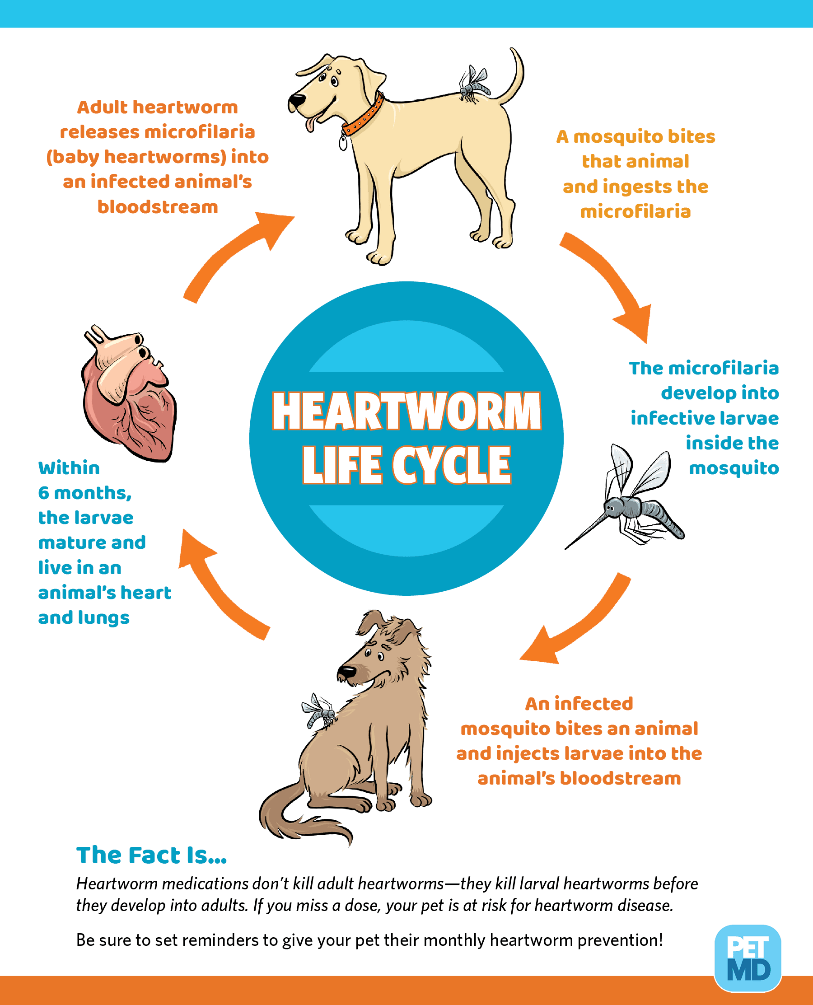When it comes to taking care of your dog, one of the essential practices is heartworm prevention. Heartworm disease is a serious and potentially fatal disease caused by foot-long worms (heartworms) that live in the heart, lungs and associated blood vessels of affected pets, causing severe lung disease, heart failure and damage to other organs in the body. All dogs- any age, breed, or size are susceptible to heartworms. It is estimated that nearly 300,000 dogs become infected with heartworm each year, and cases are reported in all 50 states. Heartworm prevention is only available at your veterinarian’s office and it is important that you discuss with them which type of preventative is best for your pet. In honor of Heartworm Awareness Month, we have compiled some of the most frequently asked questions and answers to help you keep your best friend safe and healthy.
How do dogs get heartworms?
Heartworms are transmitted by mosquitoes. When a mosquito bites an infected dog they can transfer heartworms to an uninfected dog.
Can people get heartworms from their dogs?
Mosquitos are the only transmitters of heartworms.
If one of my dogs has heartworms, can he give it to my other dogs
Since mosquitos are the only transmitters of heartworms, dogs cannot transfer this to each other. Heartworms also need an incubation period in the mosquito before they can be transmitted from an infected dog to an uninfected dog
How can I prevent my dogs from getting heartworms?
Using heartworm prevention medication is the only way to prevent heartworms. The average cost of this medication is less than purchasing a weekly coffee from Starbucks. Talk to your veterinarian to decide which prevention type is right for your dog.
What are the symptoms of heartworm infestation in dogs?
Initially there are no symptoms. As more worms form, the animal will develop a deep cough. Being easily winded will increase over time. With severe heartworm disease, we can hear abnormal lung sounds, dogs can pass out from the loss of blood to the brain, and they can retain fluids. Eventually, most dogs will die if the worms are not treated.
Once my dog has heartworms, what’s the treatment? How much will it cost?
The treatment for heartworms is limited to injectable treatment. The treatment can be very difficult on dogs and is costly. The average cost of treatment is $800-$1200, in severe cases treatment can cost as much as $2500.
If my dog is diagnosed with heartworms, can I just give him his monthly preventative instead of having him go through treatment? Won’t that kill his heartworms?
The full treatment series is best practice for treating heartworms. Giving only monthly heartworm preventative can have side-effects such as long-term damage to the heart and lungs and can lead to death in severe cases.
Can I skip giving my dog his preventative during colder months, when there aren’t any mosquitoes? (American hw society- yr round)
The American Heartworm Society recommends year round prevention as mosquito species have been adapting to colder climates. Additionally, most heartworm preventatives have the extra benefit of a dewormer for internal parasites.
If my dog gets heartworms, and is treated for them, can he get them again?
Dogs do not build immunity to heartworms. The only way to stop dogs from getting heartworms again is to keep them on heartworm prevention medication year round.

